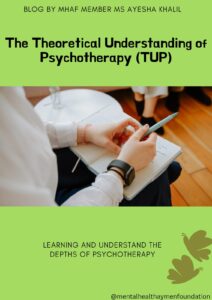The TUP (Theoretical Understanding Of Psychotherapy)

The TUP (Theoretical Understanding of Psychotherapy) model presents a complex and integrated view of psychological ‘dysfunction’. In this framework, intervention starts with a focus on one area of the psyche that is unsuccessful in its productivity and gradually takes care of other components. Such interconnection of the psyche implies that the problem in one sector leads to a disruption of all the subsequent ones. In case of Aylin, the emotional disturbances were found to be the cause of the dysfunction. Her emotional fall resulted to intrapsychic accumulation of pathological affect and negative cognitive programs indicated by sadness and poor self-regard; worthless thoughts like “My husband does not care for me,” and “Nobody cares for me.”
A ylin’s emotional empathy, specifically to rejection, was expressed by extreme anger, especially to criticism from her husband. These emotional responses entailed negative activities such as watching TV most of the time and failure to perform her work. Also, she developed resentment to God and consequently to any practices which she considered as trials that denied her human rights. The resentment led to loneliness and a feeling of spiritlessness.
Emotions are seen, therefore, as multifaceted resulting from a number of factors; including the biological, cognitive and spiritual. Emotions are about failed, and when these are dysfunctional, they may result in either hyper- or hypo arousal. Aylin’s low mood and aggression corresponded with unmet affective needs, including the inability to get the feeling of being appreciated. In general her negative cognitive schema where perpetuating these emotions resulted in distorted thinking and thus unhealthy behaviors.
The idea of nafs, or behavioral dispositions, is an essential part in Aylin’s case. Self-destructive behaviors such as screaming at the spouse, or refusing to talk to him, which can be attributed to nafs are impulsive, and based on impulse responses. Such behaviors seemed to give some relief and for a while effectively prevented discomfort but only created a chain of continuous dysfunctional patterns. Many of these issues lie at the core of individual identity and value and are therefore integral components of therapy when considered from within the TUP model.
